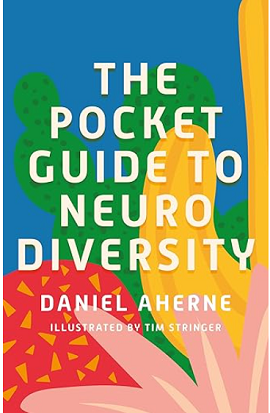On the path to building a fully inclusive society, it is crucial to consider all groups of people who may face discrimination and difficulties in the workplace and whose everyday lives could benefit significantly from a few simple changes in their work environments.
In his book ‘The pocket guide to neurodiversity’, Daniel Aherne examines how to understand and help one such group: non-neurotypical people. This is a small but powerful book, expertly illustrated by Tim Stringer and addressed primarily to people in managerial positions. In a broader sense, it should appeal to all staff members who would like to understand their neurodivergent colleagues and support them by adapting the work environment to their needs.
The guide starts with a straightforward explanation of neurodiversity and its different subtypes, which include autism, ADHD, dyslexia and dyspraxia (difficulties with coordination). When explaining how individuals with these characteristics function in a world adapted to neurotypical people, the author uses the metaphor of biodiversity. He suggests thinking of a person, such as someone on the autism spectrum, as if they were a cactus put in an unsuitable environment. Just because the cactus doesn’t develop properly doesn’t mean there is a problem with it. It simply requires different conditions to thrive.
Daniel Aherne, who has twenty years of experience working with neurodivergent people, owns a company that organises workshops and consultations for employers to help them better understand their non-neurotypical employees. His tips (which can also be found in this book) are clearly expressed and easy to put into practice.
Aherne offers different solutions for different subtypes of neurodiversity. For example, for people on the autism spectrum, a sense of stability and routine is crucial. When communicating with them, it is essential to stick to a plan. Having a dedicated parking space is also helpful. On the other hand, for people with dyslexia, it could be beneficial for them to be able to present their work verbally instead of on paper, etc.
The author recommends being open to what others say during conversations and not being prejudiced or disrespectful to anyone. Of course, that advice could be useful for all interactions, not just interactions with this social group – but there are some things that are characteristic of neurodivergent people which some neurotypical people may be completely unaware of. Understanding that individuals on the autism spectrum often struggle to maintain eye contact during conversation, for instance, could significantly facilitate everyday interactions.
Reading this book will help you to understand the behaviour of work colleagues who may be non-neurotypical. They may not react in the way you expect, but this is not out of ill will. It is simply because they have a different way of understanding the world and different needs – just like a cactus, which also has no control over the fact that it grows best in specific conditions.
About the authors:
Daniel Aherne started his journey with neurodiversity in 2000 by volunteering to support an autistic boy on a playscheme. This led to him working in the National Autistic Society’s employment team, where he managed the area of employment training. In 2016, he founded Adjust to raise awareness of neurodiversity in the workplace.
Tim Stringer is an illustrator with autism. His most recent work includes illustrations for two books on neurodiversity for Jessica Kingsley, the specialist independent publisher.
If any colleagues working in the Council are interested in reading the book, the electronic version is available from the Council Library via Eureka
This post does not necessarily represent the positions, policies or opinions of the Council of the European Union or the European Council.
The Council Library is located in the Justus Lipsius building, at JL 02 GH, Rue de la Loi/Wetstraat 175, 1048 Brussels (Froissart entrance) – opening hours Monday to Friday 12:30 – 15:30.
It is open to all staff of the Council of the European Union and the European Council, trainees, permanent representations of member states. Access to some library holdings may be restricted to on-site consultation.
If you are a researcher or university student, you are welcome to visit our reading room for on-site consultation of our collections.




